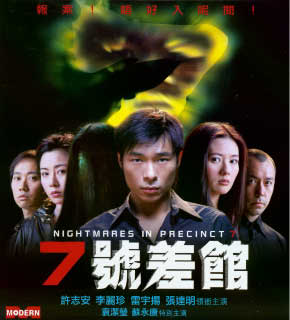Nightmares in Precinct 7

Director: Herman Yau
Year: 2001
Rating: 7.0
This film was put
together by the same team that produced Killing End with Herman Yau directing,
Simon Loui and Yau writing the script and Andy Hui and Loletta Lee headlining
the cast. It’s a much stronger film than Killing End and produces a surprising
amount of pathos and sense of loss along the way. It takes certain elements
from different films and different genres and comes close to producing an
entirely new genre – the cop/ghost buddy film. Ghosts and the supernatural
weave in and out of the story – but they aren’t the frightening ones – much
more horrifying is man.

Andy Hui is a top cop and leads his team on an assignment to capture a gang
of killers – but in an attempt to capture them two of his men are killed and
he is shot through the head and goes into a coma. A very long coma. He wakes
up more than two years later to discover that his mother has died and his
girlfriend, Fennie Yuen, has married another man – and he feels an oppressive
sense of guilt for the two men who died under his command. He also sees the
dead. Everywhere.

The ghosts share the world with us - but they go about their business
and make no real attempt to interfere with the living – and Andy begins a
friendship with one of them, Cheung Tat-ming, a psychiatrist who died at a
young age. He also begins a friendship with the nurse who cared for him during
his coma, Loletta. When he is better he goes back to duty and he and his
partner, Simon, are assigned to find a serial killer of nurses – and yes
– his next target is Loletta - but it all plays out much differently
than one might expect. Cheung gives him advice not only on the characteristics
of the killer, but he can also sense when the life meter of an individual
is diminishing and Loletta’s is dropping faster than hemlines in the 90s.

Within this almost standard plot (excepting the ghost angle of course),
Yau permeates the film with layers of sadness for both the living and for
the dead, the inevitability and acceptance of death and at the same time
the need to continue living for as long as we can. There are a couple underplayed
but moving scenes that give the film some depth – Hui’s meeting with a guilt-ridden
Fennie after coming out of his coma, his being forgiven by his two dead comrades,
his quiet talk with one of the dead nurses and the final jolting scene that
is wrenching and life affirming at the same time. These are not emotions that
one would necessarily expect from what might be perceived as a low budget
horror film – but horror is not at all what Yau is aiming for here - unless
it is simply the horror of all of us having to let go of life someday.

Making appearances also are Lam Suet as the small time thief, William So
as the relative of one of the dead cops and Henry Fong Ping as Hui's supervisor.





